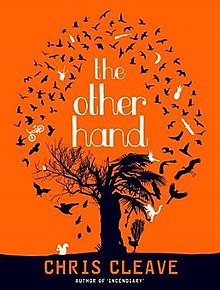The Other Hand

Front cover of the first edition
|
|
| Author | Chris Cleave |
|---|---|
| Country | United Kingdom |
| Language | English |
| Genre | Literary fiction |
| Publisher | Sceptre |
|
Publication date
|
7 August 2008 |
| Media type | Print (hardcover) |
| Pages | 368 pp (first edition) |
| ISBN | |
| OCLC | 227274979 |
The Other Hand, also known as Little Bee, is a 2008 novel by British author Chris Cleave. It is a dual narrative story about a Nigerian asylum-seeker and a British magazine editor, who meet during the oil conflict in the Niger Delta, and are re-united in England several years later. Cleave, inspired as a university student by his temporary employment in an asylum detention centre, wrote the book in an attempt to humanise the plight of asylum-seekers in Britain. The novel examines the treatment of refugees by the asylum system, as well as issues of British colonialism, globalization, political violence and personal accountability.
The novel was published by Sceptre, an imprint of Hodder & Stoughton. Sales were initially slow, but increased as a result of "word-of-mouth" publicity, with the book eventually ranking 13th on the 2009 Sunday Times bestseller list. It has also been ranked #1 on the "New York Times" bestseller list. The novel has received mixed reviews from critics. It has been praised for its focus on underlying human decency; however, some reviewers felt its events were contrived. The two protagonists have been juxtaposed, with less sympathy evoked by Surrey-born Sarah than Nigerian-refugee Little Bee. The novel was nominated for the 2008 Costa Book Awards and a 2009 Commonwealth Writers' Prize. A film adaptation is being developed, and will be produced by and star Nicole Kidman.
Cleave spent his early childhood in West Africa, which he credits for having partially inspired The Other Hand. Further inspiration came from Cleaves's temporary employment while studying experimental psychology at the University of Oxford. During the summer, Cleave painted underpasses, gardened and picked up litter, and hoped to use this experience to write a book. His final job was at Campsfield House in Oxfordshire, an immigration detention centre. Cleave spent three days serving food to residents from war zones including Somalia, Eritrea and the Balkans. He explained: "I got talking with some of them and said why are you here? Why are you in prison? It's not illegal and yet we concentrate them in these places. It's a text-book definition of a concentration camp. The conditions are appalling. I was shocked enough for that to be the end of my light comedy book of my amusing summers working as a labourer." Cleave believes he would not have written the novel were he not a parent, as he does not wish for his children "to grow up into a world that is callous and stupid."
...
Wikipedia
